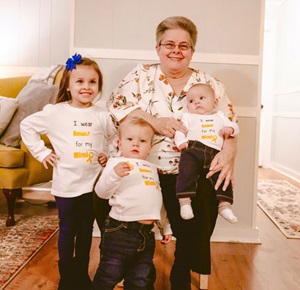 After Vanessa Davis received a computerized tomography (CT) scan in the emergency room due to a kidney stone, an incidental finding was that her liver looked cirrhotic. Eight months later, a follow up CT scan confirmed that Vanessa had appendix cancer.
After Vanessa Davis received a computerized tomography (CT) scan in the emergency room due to a kidney stone, an incidental finding was that her liver looked cirrhotic. Eight months later, a follow up CT scan confirmed that Vanessa had appendix cancer.
“Everything happened so fast,” said Vanessa. I decided that the best thing to do would be to get another opinion. I researched the most experienced cancer centers in my area to treat appendix cancer.”
This research lead Vanessa to the Wake Forest Baptist Comprehensive Cancer Center, the only NCI-designated cancer center in the region. The NCI designation indicates that a Cancer Center meets the highest levels of expertise and a commitment to patient care, cancer research, and clinical trials.
Vanessa was able to see an appendix cancer specialist quickly through Wake Forest Baptist’s Cancer Second Opinion program which provides patients with a full diagnosis and treatment plan within days of initial visit, usually within a week.
“In Vanessa’s case, getting a second opinion was extremely important,” said Dr. Edward Levine, Chief of surgical oncology. “Appendix cancer is rare and most oncologists see less than one appendix cancer cases per year. At Wake Forest Baptist Health, we treat one to two patients per week. It’s key for those diagnosed with appendix cancer to come to an experienced cancer center who provides each patient with an experienced team of not only doctors and nurses but others such as radiology technicians, nurse navigators, anesthesiologists, and therapists.”
“Even though appendix cancer is rare, there are several subtypes,” said Dr. Edward Levine. “Vanessa presented with mucinous adenocarcinoma of the appendix. This is the second most common type of appendix cancer. Vanessa received surgery and hyperthermic intraperitoneal chemotherapy (HIPEC) to treat her advanced appendiceal cancer. HIPEC is performed in concert with traditional surgery; the logic behind the procedure is that, when cancer-fighting drugs can be applied directly to the malignant cells in the peritoneal cavity, they are more effective.
“Think of the surgery as a search and destroy mission taking anything out that has a tumor on it,” said Dr. Levine. “Additionally, we have performed over 1,600 HIPEC procedures, which makes our team one of the most experienced teams in the world.”
Today, Vanessa shows no evidence of cancer and is thankful she decided to get a second opinion.
“Getting a second opinion was one of the best decisions I have ever made,” said Vanessa. “It saved me from getting treatment that wasn’t needed and that wouldn’t work for my particular cancer. I couldn’t have had a better care team and I couldn’t be doing better. Everyone was so good to me and had a wealth of knowledge.”
Dr. Levine encourages those with cancer, especially rare cancers, to make sure they are at a cancer center with a team experienced in treating their particular type of cancer.
“One thing that Dr. Levine stressed was ‘go live your life,’” said Vanessa. “This has really stuck with me and I am thankful for the care I have received at Wake Forest Baptist so I can do just that.”
